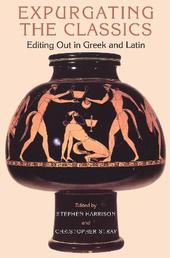
|
Expurgating the Classics: Editing Out in Greek and Latin
Paperback / softback
Main Details
| Title |
Expurgating the Classics: Editing Out in Greek and Latin
|
| Physical Properties |
| Format:Paperback / softback | | Pages:240 | | Dimensions(mm): Height 234,Width 156 |
|
| Category/Genre | Literary studies - classical, early and medieval |
|---|
| ISBN/Barcode |
9781472558534
|
| Classifications | Dewey:880.3 |
|---|
| Audience | | Tertiary Education (US: College) | | Professional & Vocational | |
|---|
|
Publishing Details |
| Publisher |
Bloomsbury Publishing PLC
|
| Imprint |
Bloomsbury Academic
|
| Publication Date |
27 February 2014 |
| Publication Country |
United Kingdom
|
Description
In the first collection to be devoted to this subject, a distinguished cast of contributors explores expurgation in both Greek and Latin authors in ancient and modern times. The major focus is on the period from the seventeenth to the twentieth century, with chapters ranging from early Greek lyric and Aristophanes through Lucretius, Horace, Martial and Catullus to the expurgation of schoolboy texts, the Loeb Classical Library and the Penguin Classics. The contributors draw on evidence from the papers of editors, and on material in publishing archives. The introduction discusses both the different types of expurgation, and how it differs from related phenomena such as censorship.
Author Biography
Stephen Harrison is Professor of Latin Literature, Corpus Christi College, Oxford. He is the author of many books and articles, including Vergil Aeneid 10 (1991), Homage to Horace (ed.) (1995), Apuleius: a Latin Sophist (2000), Generic Enrichment in Vergil and Horace (2007). Christopher Stray is Honorary Research Fellow, Department of History and Classics, Swansea University, and Senior Research Fellow, Institute of Classics, University of London. He is a leading expert on the history of classical scholarship and the editor or co-editor of several collected volumes including Oxford Classics (2007), Remaking the Classics (2007), AE Housman (2009) and Classical Dictionaries (2010).
ReviewsThe cumulative impact of reading this book is to make the reader far more aware than he or she might have been of the decisions and impulses that go into producing texts, translations, and commentaries of Greek and Latin literature...This volume makes an original and valuable contribution to our knowledge about expurgation and the field of classics. Its various chapters present a host of fascinating examples, as well as enlightened theorizing on the topic. -- Ronnie Ancona, Hunter College and CUNY Graduate Center * Bryn Mawr Classical Review *
|